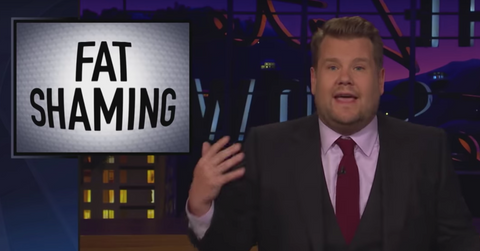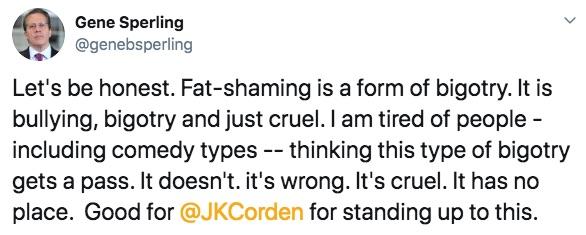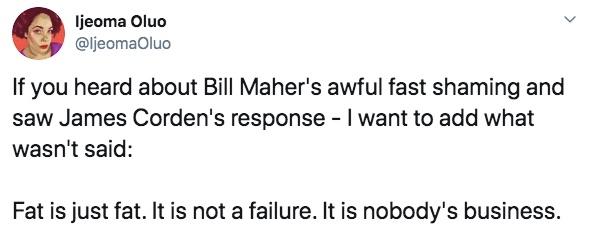James Corden Calls out Bill Maher for Fat-Shaming Segment
Updated Sept. 16 2019, 11:48 a.m. ET
Bill Maher, the host of HBO's Real Time With Bill Maher, which I'm now just realizing is a ridiculous name for a show (Real Time? Not Real Talk? What does "Real Time" mean?), isn't exactly known for his tact or compassion. So when he had a segment on his show about our broken healthcare system, it was not a surprise that he decided to blame fat people for it and to call for fat-shaming to make a "comeback."
"Being fat isn't a birth defect," Maher spits out. "We have gone to this weird place where fat is good. It's pointing out that fat is unhealthy, that's what's bad ... Fat-shaming doesn't need to end, it needs to make a comeback. Some amount of shame is good."
James Corden, the host of CBS's The Late Late Show with James Corden, realized after viewing this segment that he had a platform from which to address these harmful comments and a personal history of being fat-shamed in just the way that Bill Maher was suggesting. So he set aside some time on his show to respectfully call out Bill Maher and throw some facts about obesity and fat-shaming in his smug face.
James first acknowledges that he and Bill Maher have a lot in common. They've both acted in terrible movies, they both shoot their shows on the same lot, and every time James has met Bill in person, he's been "nothing but pleasant and kind and nice." But then, James tactfully manages to say what we were all thinking. That fat-shaming doesn't need to make a comeback, first and foremore because it "never went anywhere."
"Ask literally any fat person," he says. "We are reminded of it all the time. On airplanes. On Instagram ... There's a common and insulting misconception that fat people are stupid and lazy and we're not. Right? We get it. We know ... We're not all as lucky as Bill Maher. You know? We don't all have a sense of superiority that burns 35,000 calories a day."
He goes on to say that he genuinely believes that Bill Maher is trying to offer up some "tough love," but he doesn't hide from the truth, which is the fact that fat-shaming doesn't work. "It's proven that fat-shaming only does one thing," James says, "It makes people feel ashamed. And shame leads to depression, anxiety, and self-destructive behavior."
All fat-shaming does is make fat people feel like they are not worth as much because they are fat. And that is ludicrous. Fatness is just a quality, like brown eyes or your height. It's not an indicator of overall health and it's not necessarily the person's "fault," which is a fact that James tackles next. "There are numerous reasons why people live their lives at an unhealthy weight," he says.
And poverty is one of them. "A study conducted by the University of Michigan Health System found that childhood obesity is directly linked to poverty," he says. Obesity has also been linked to genetics. Fat in and of itself is not bad. We as a dumb society have decided that thin is better and worth more than fat (which wasn't always the case, by the way! Fatness used to be an enviable quality, indicative of wealth and status!), but that is not the objective truth.
"Until we make healthy food and heath care more accessible and we properly educate people on nutrition and exercise, maybe we can hold back on the whole 'call fat people virgins until they lose weight' strategy," James continues.
That's part of battling the epidemic of obesity, but it's even more complicated than James allows here. Until fresh, healthy, unprocessed food is affordable for all and available everywhere, until doctors shift their thinking and stop believing that fat is inherently bad, until people like Bill Maher no longer have a voice, fat-shaming will exist, and it will continue to do only harm.
James concludes the video by addressing Bill Maher directly: "While you're encouraging people to think about what goes into their mouths, just think a little harder about what comes out of yours."
The health of our population should be our main concern. And yes, childhood obesity is a problem that must be dealt with. But the fact of fatness is not a measure of value. Fatness in and of itself does not necessarily mean that someone is unhealthy, just as thinness doesn't automatically indicate health. Author Ijeoma Oluo added to the conversation started by James Corden in a vital way with her tweet.
"You deserve to be treated like a human being if you are fat and lose weight," she continues, "if you try to lose weight and can't, if you're fat and feel no desire to lose weight at all. Your body is your business and you deserve the right to exist in it in peace. Losing weight will not make you a smarter person, a more kind person, a more lovable person. It will just make you smaller. And probably hungry."



